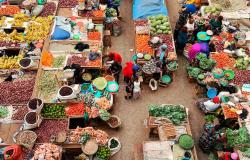Africa has a New Agenda for its Next Decade of Agrifood Systems Transformation. Now What?

Layih Butake and Augustin Wambo Yamdjeu hail the new plan and call local expertise to drive its implementation.
It's official: the new Comprehensive Africa Agriculture Development Programme (CAADP) Strategy and Action Plan: 2026-2035 has received the seal of approval of African Heads of State and Government. The successor framework to the Malabo Declaration was adopted at the African Union's (AU) Extraordinary CAADP Summit on January 11, 2025, in Kampala, Uganda, where the continent's leaders endorsed the 10-year strategy for "Building Resilient Agrifood Systems in Africa." This is a pivotal moment.
The CAADP Kampala Summit was the apotheosis of a highly inclusive Post-Malabo Agenda development process that leveraged multi-stakeholder efforts to craft a comprehensive agenda that builds on 20 years of CAADP successes and lessons. Anchored on a vision for "Sustainable and Resilient Agrifood Systems for a Healthy and Prosperous Africa," and led by the African Union Commission Department of Agriculture, Rural Development, Blue Economy, and Sustainable Environment (AUC-DARBE) and the AU Development Agency—New Partnership for Africa's Development (AUDA-NEPAD), in collaboration with key technical partners, the Post-Malabo CAADP Agenda adopts a broad-based agrifood systems approach that addresses critical thematic areas at the intersection of agriculture, nutrition, resilience building, and economic development in the face of a changing climate.
With the CAADP guiding principles reiterated and strategic objectives defined, the daunting challenge of translating these ambitions into tangible outcomes remains. As Africa enters the CAADP Kampala era, centering evidence and multistakeholder cooperation will provide viable pathways for domestication and robust implementation toward sustainable and resilient agrifood systems.
From Maputo to Malabo: Progress and Challenges
Before Malabo, there was Maputo – the 2003 framework that ratified the establishment of CAADP. A continental response to the stagnation of the agricultural sector, the Maputo Declaration proposed four main pillars: sustainable land and water management, rural infrastructure and trade-related capabilities for market access, increasing food supply and reducing hunger, and agricultural research and technology. Prominent among the decisions in the Maputo Declaration were investment commitments, notably the allocation of at least 10% of national budgets to agriculture, with the goal of increasing agricultural productivity by 6% annually.
The 2014 Malabo Declaration reconfirmed agriculture's priority status on Africa's development agenda. Building on Maputo, it provided a blueprint to drive CAADP implementation, guiding the AUC, AUDA-NEPAD, Regional Economic Communities (RECs), and Member States in achieving agricultural transformation. The seven Malabo commitments underscored recommitment to the CAADP values and principles, enhancing investment finance in agriculture, with commitments to end hunger and halve poverty by 2025, boost intra-African trade in agricultural commodities/services, strengthen resilience to climate variability and other shocks, and promote mutual accountability.
The CAADP Biennial Review (BR) process, as institutionalized by the seventh commitment of the Malabo Declaration, is a novel African homegrown model that stands as the central mutual accountability mechanism to track the progress of AU Member States in achieving the Malabo commitments. After four BR cycles conducted in 2017, 2019, 2021, and 2023, the data indicates that African countries are not on track to achieve the Malabo targets by 2025 despite considerable progress.
Still, CAADP implementation can be credited with contributing to agricultural and economic growth across Africa. After two decades of implementation, agriculture has conspicuously risen to the top of Africa's political agenda, signaling a strategic opportunity for the Post-Malabo Agenda to leverage this momentum to advance the continent's agrifood sector.
Mainstreaming Strategic Objectives into Programmatic Interventions
The core rationale of the recently adopted CAADP Strategy and Action Plan is accelerating agrifood systems transformation, tackled from a multisectoral approach toward sustainable, agriculture-led growth across Africa.
For targeted interventions, the Post-Malabo Agenda highlights trends and drivers that will shape Africa's food systems over the next decade, including changing consumption patterns, climate change, economic growth, nutrition, sustainable water management, regional integration, trade policies, rising population, and urbanization, as well as gender dynamics and youth engagement.
The strategy recognizes the cross-cutting dynamics and the crucial need for integrated policy action to have a meaningful impact across agrifood system components, including primary production, food distribution, supply chains, and household consumption.
Centering Data and Localized Expertise
When it comes to the principles of African ownership and leadership, the Post-Malabo Agenda is already on track.
Two decades of CAADP have considerably raised awareness among African policymakers of the need to fully embrace evidence-based planning, implementation, and performance tracking. The consultative process leading up to the Kampala Summit was widely inclusive and participatory, with African centers of excellence driving the knowledge creation effort that informed the agenda-setting. From the onset, this process offered a seat at the table to a broad range of stakeholders to build consensus, strengthen institutional capacity, and foster greater transparency and accountability.
The new strategy recognizes the central role of data in the policy cycle. The Post-Malabo Agenda development process put in place mechanisms for integrating research findings, knowledge, and evidence-based approaches alongside dialogues with RECs and stakeholders to inform the technical design, drafting, and promotion of the new framework. Under the Post-Malabo Agenda development process, the Data and Analytics workstream led by AKADEMIYA2063 facilitated the deployment of 13 Technical Working Groups (TWGs) to provide analytical support to AUC-DARBE in the formulation of the ten-year strategy. The knowledge generated during these consultations will continue to inform stakeholder dialogues as the continent gears up for the implementation phase.
Now, the Kampala era is upon us. As the continent settles into the post-summit chapter, leveraging African expertise would be indispensable to ensuring that this novel policy framework adapts to emerging hot topics, promotes adaptive learning, seizes opportunities, and tackles challenges for inclusive, resilient, and sustainable agrifood systems.
Dr. Layih Butake is the Director of Communication and Outreach at AKADEMIYA2063
Dr. Augustin Wambo Yamdjeu is the Director of Knowledge Systems at AKADEMIYA2063
Photo by Kwizera Theogene

